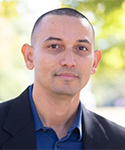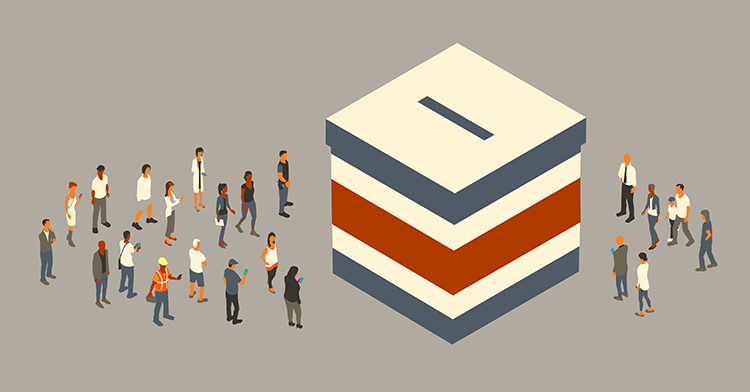Elizabeth Dias covers faith and politics for Time magazine, where she has written about issues from the pope's U.S. visit to the Muslim headscarf controversy at Wheaton College -- her alma mater.

Dias said that studying theology -- she also has an M.Div. from Princeton Theological Seminary -- has proved useful in her career as a reporter, and not just because she covers religion.
“I am very grateful for my theological education,” she said. “That formation really enabled me in many ways to be a truth teller, and I’m very grateful for that.”
She spoke to Faith & Leadership while at Duke to give a lecture on covering faith and politics in an election year. The following is an edited transcript.
Q: What do you think will happen in the next decade with this generation of “spiritual but not religious” young people?
For the first time in America’s history, really, we have the rise of a more “godless” generation. Where that will take the country is still a question mark.
When I report on it, I try to break it down. One of the main differences that I see is just how it plays out in different racial and ethnic groups.
The “none” category growing in Latino communities, for example, is still much more connected with family and faith commitments. I think it’s important to recognize that nuance.
Then there’s the Pope Francis phenomenon, and the question of how he can perhaps stem the exodus of young people from institutional faith. I see young people being much more comfortable picking and choosing faith practices than their parents’ generation, and Pope Francis is a huge draw. People are looking more to inspirational figures than institutions.
Q: Are there others that appeal to that generation?
It’s hard to find someone at the same level as Pope Francis. In the United States, there was the Obama draw in 2008, when young people flocked to the polls really looking to his “hope and change” narrative.
But in a spiritual way, it’s really hard to find those global, big-level spiritual leaders. There isn’t polling on them in the same way that there is for someone like the pope; I don’t see it for the Dalai Lama in the same way.
Q: Do you think that there’s a change in the role of Catholicism in American culture with Pope Francis, or is it just an exciting moment?
The timing of his rise is interesting, given U.S. politics -- we’ve been seeing a real reset at the national political level in terms of the Catholic voice. There are more Catholic Republicans in the U.S. House of Representatives than there are Catholic Democrats. At the same time that Catholic Republicans are rising, you have Pope Francis coming in and talking about issues like the economy, poverty, climate change, whereas the issues historically for the Catholic public voice have been abortion, marriage, etc.
So it’s a real shuffling of the deck in terms of what issues are on the table. We really saw that come to a head when he visited the United States. Traditional Catholic groups weren’t the only ones lobbying to get papal support for their issues -- we had disability groups and environmentalists lobbying the Vatican for representation during the visit. That changed the conversation.
Q: And what about Pope Francis’ style of leadership on the global stage, in an international context? Has his role changed in that arena as well?
It’s impossible to calculate the power of a new voice from South America that’s in St. Peter’s seat, a position that has been European-dominated.
When Pope Francis visited the United States, he gave 14 out of 18 talks in Spanish. It was impossible to watch that whole trip and not realize that the future of the church in the United States is Spanish-speaking. That just changes the center of gravity in a new way.
When he came to the United States, every television network showed the papal trip. But during his trip to Mexico, it was the Spanish-language networks in the U.S. -- like Univision and Telemundo -- that showed the pope all week; the English-language networks were all about the U.S. presidential election. The difference between the two exposes some of the demographic shifts in the United States.
Q: You covered the pope, and you also covered the Muslim headscarf controversy at Wheaton. How was that for you as a reporter, and has it changed your relationship with your alma mater?
Journalism at its best is about truth telling. That can get complicated, but truth, in the end, is what stands. I don’t believe that truth is something to be afraid of, and I would hope that exposing truth can further conversations of justice and reconciliation going forward, for any story.
Q: You’re dealing with an institution that you know well and that you love. The messiness and the complications become difficult, I would assume.
It’s a unique position as a reporter to have covered everything from inside diplomacy at the Vatican to foreign policy in Sudan to a situation at an evangelical liberal arts school that I happened to attend.
Everyone comes at any experience they have in life from whatever has formed them, and I am very grateful for my theological education. I studied theology at Wheaton, and I have an M.Div. from Princeton Theological Seminary. That formation really enabled me in many ways to be a truth teller, and I’m very grateful for that.
Q: Do you think that’s an area that points to any larger issues for religious institutions and their leaders?
This academic year, there have been so many student protests over a variety of issues at storied universities around the country. I’m thinking of protests at Yale, here at Duke. This is not an uncommon narrative.
It’s just the topic of what the disruption is about, the actual discrepancy -- that is what’s different. But there are a lot of forces at play -- generational, demographic changes. The student population at these schools has different interests than even 10 years ago.
For young people, there is an increasing openness toward diversity, not just racially but when it comes to sexuality. Those are real watersheds. This is also the first generation that’s really been formed by the Internet and the access to information. These are huge societal changes.
I’m not surprised that it’s coming to a head with institutions that help students learn and help them ask these great questions. Yet the leaders of these institutions are often two generations older than the students. There are generational values that are fundamentally different. There’s not necessarily a moral judgment attached to that; it’s just what it is.
So then the question becomes what do you do with that, and how do you handle that tension responsibly.
With Wheaton specifically, it does point to demographic changes in evangelicalism in general in America. Again, the younger generation tends to be more open -- in Wheaton’s case, the issue was openness to Islam -- and so being more open to interfaith dialogue, these kinds of things.
In that sense, it really is a fight for what should the future of evangelical faith be and what is Wheaton as an institution’s role in that. That’s a different institutional question than what’s happening at Yale or at other places, but it does have institutional ramifications for other evangelical institutions in the United States.
Q: You mentioned politics. In covering politics, obviously religion is always a major issue. What do you think are the important religious issues at stake in the election?
This election, more than any other in years, is pointing out huge undercurrents that are not just bubbling to the surface but erupting to the surface -- discontent, fear, anger -- in ways that haven’t been emphasized before. So the normal political patterns can’t be trusted in the same way. And the same goes, then, for political predictions.
I think, because the economic issues are so great, religious issues tend to fade a bit, but I know I’m hearing a lot of people being concerned about Supreme Court nomination picks. That’s where a lot of the religious liberty issues are going to surface, in court decisions going forward.
The big issues that could affect the election religiously, I think, might be more outside the United States than they are inside. We have months to go before the election, and we see what’s happening in the Middle East with so many refugees fleeing to Europe, most of them Muslim.
Then there’s the terrorism question, and the way it’s interpreted as being a religious question.
All of those things are a big boiling pot, and there is a lot of time left for more disruption. Even since the Paris terrorist attacks, there have been more, in Brussels, in Pakistan, and those are very live issues that have big implications for how the national mood is here in the United States, and what voting choices people will make.






